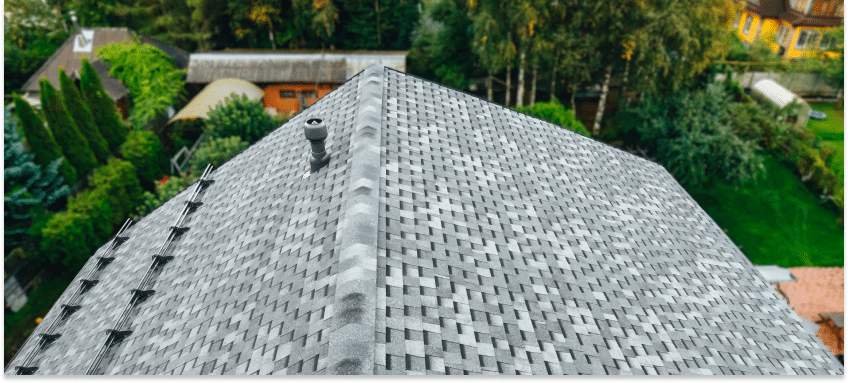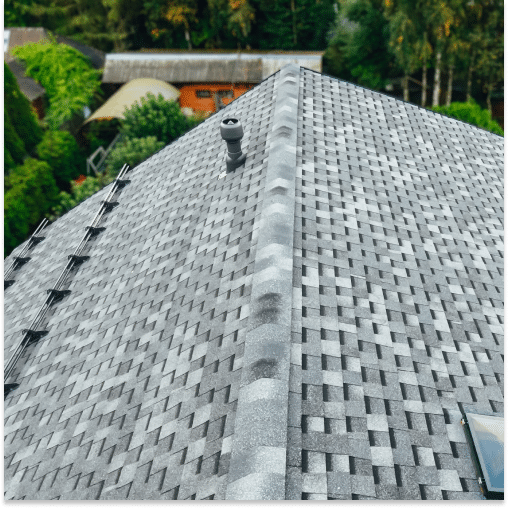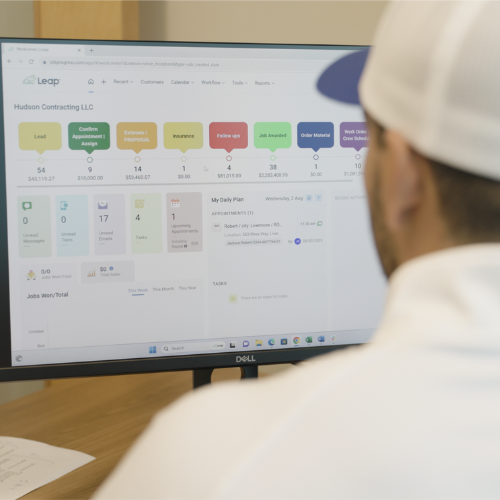The roofing industry has come a long way from its humble beginnings of thatched roofs and mud huts. In today’s world, roofing technology has evolved at a staggering pace. And it’s driven by a combination of innovation, environmental concerns, and the quest for improved efficiency and safety.
As we approach 2024, let’s take a closer look at the 10 best trends that are shaping the future of this vital industry. Learn just where your business is ahead of the curve or falling behind.

Evolution of Roofing Technology
To truly appreciate the advancements occurring in roofing today, it’s essential to understand how the industry has evolved over time. Early roofs were often simple structures made of organic materials like thatch, wood, or clay. These roofs provided minimal protection from the elements and had a relatively short lifespan.
The transition to more durable materials, such as slate and asphalt, marked a significant leap forward in roofing technology. These materials offered improved resistance to weather and environmental factors. However, these materials came with their own set of challenges, including weight issues and maintenance requirements.
In recent decades, roofing technology has experienced a revolution, thanks to advances in materials, construction techniques, and the integration of digital tools. These developments have not only improved the durability and longevity of roofs, but also enhanced their energy efficiency, safety, and overall performance.
Now, as we approach 2024, let’s explore the 10 best roofing technology trends that are set to redefine the industry.
1. CRM Software Integration
Customer Relationship Management (CRM) software has become a game-changer for roofing contractors. Roofing CRM solutions are designed to streamline business operations, enhance customer interactions, and improve project management.
By incorporating CRM software into their operations, roofing companies can benefit from better lead management, efficient scheduling, and improved communication with homeowners. In fact, it’s become the most efficient way to run a roofing business.
CRM systems allow contractors to track customer inquiries, schedule appointments, and automate tasks. These tools can also help optimize sales strategies, increase customer retention, and provide valuable insights through data analytics.
In a competitive market, CRM software is an indispensable asset that roofing companies can use to stay ahead. And it takes the top spot on this list now that it’s become the most essential roofing technology to invest in.

2. Imaging Tools
Advanced imaging tools have become an integral part of the roofing landscape. Drones equipped with high-resolution cameras and thermal imaging sensors are being used to conduct thorough roof inspections quickly and safely. This technology allows contractors to identify issues like leaks, damaged shingles, or insulation problems without the need for physical access to the roof.
Moreover, the benefits of imaging tools extend beyond inspections. Roofers can use these tools to generate accurate 3D models of the roof. This aids in the planning and estimation stages of a project.
Additionally, by detecting problems early, imaging tools can help prevent costly repairs down the road. This saves both time and money for homeowners and contractors alike.
3. Sustainable Roofing Materials
As environmental concerns grow, the demand for sustainable roofing materials is on the rise. Sustainable options, such as solar shingles, green roofs, and cool roofs, are gaining popularity.
Solar shingles, for instance, integrate solar panels directly into the roofing material. This allows homeowners to generate their own electricity and reduce their carbon footprint.
Green roofs are another sustainable trend, featuring vegetation that not only provides insulation but also improves air quality. Cool roofs, on the other hand, reflect more sunlight and absorb less heat. This reduces energy consumption for cooling purposes.
The industry’s commitment to sustainability reflects a broader shift toward eco-friendly practices and materials. Expect to see more energy-efficient roofing technology in 2024 and beyond.
4. Enhanced Weather Prediction Technology
Weather is a significant factor affecting the durability and performance of roofs. With the increasing frequency and intensity of extreme weather events, roofing technology is incorporating enhanced weather prediction tools.
These tools provide contractors with real-time data on upcoming weather conditions. It enables them to plan roofing projects more effectively and avoid weather-related delays.
By staying ahead of adverse weather, roofing contractors can improve project timelines and reduce the risk of damage to the roofing materials during installation.
This technology also enhances worker safety. It allows contractors to proactively reschedule work during hazardous conditions.
5. Augmented Reality (AR) for Roof Design and Visualization
Augmented Reality (AR) is making its mark in the roofing industry by providing innovative design and visualization solutions. Roofers can use AR applications to overlay digital representations of roofing materials and designs onto a real-world roof structure. This allows customers to visualize how different materials and styles will look on their homes before making a final decision.
AR technology also aids in precise measurements and calculations. It reduces errors in material estimation as well.
Overall, roofers can use AR applications to measure roof dimensions, angles, and slopes accurately. This ensures that they order the right amount of materials for the job. Furthermore, the technology enhances customer satisfaction by providing a more interactive and transparent experience.
6. Smart Roofing Systems
The rise of the Internet of Things (IoT) is making a mark on roofing technology. It’s given birth to smart roofing systems that integrate sensors, cameras, and connectivity features. These systems offer real-time monitoring and control over various aspects of a roof’s performance. For example, sensors can detect leaks, temperature fluctuations, or even damage caused by debris.
Smart roofing systems can alert homeowners and roofing contractors to potential issues. Additionally, these systems can be integrated with home automation platforms, providing homeowners with the ability to control aspects of their roofs remotely. The result is increased energy efficiency and comfort.
7. Advanced Roof Coatings
Roof coatings have been a staple of roofing technology for years. In general, they offer protection against the elements and extend the lifespan of roofing materials.
However, recent advancements in coatings have taken them to a new level. Cool roof coatings, for instance, can significantly reduce a building’s energy consumption by reflecting sunlight and reducing heat absorption.
Additionally, hydrophobic coatings are gaining popularity for their ability to repel water and prevent moisture damage. These coatings protect the roof and improve its resistance to algae, mold, and other contaminants. With more options available, roofing contractors can select the right coating to enhance the performance and durability of a roof.
8. Predictive Maintenance with Artificial Intelligence (AI)
Artificial Intelligence (AI) is revolutionizing roofing technology by enabling predictive maintenance. AI algorithms can analyze data from sensors and inspections to predict when a roof is likely to require maintenance or repairs. By proactively addressing issues before they become major problems, contractors can save time, money, and resources.
It will take time before AI-driven predictive maintenance becomes the new standard for roofers. Nonetheless, its value is clear. It improves safety by identifying potential hazards on the roof. Contractors can address these hazards before sending workers onto the roof, reducing the risk of accidents.
This technology promotes long-term sustainability by extending the life of roofing materials. In addition, it reduces the environmental impact of premature roof replacements.
9. Modular Roofing Systems
Modular roofing systems are gaining traction as a sustainable and cost-effective roofing trend. These systems consist of prefabricated components that are assembled on-site.
Modular roofs offer several advantages, including faster installation, reduced waste, and increased design flexibility. Furthermore, the modular approach allows for the incorporation of sustainable materials, such as recycled content or energy-efficient insulation.
Additionally, these systems are designed to be replaceable and upgradable. It makes future repairs and renovations more straightforward. As the roofing industry continues to embrace sustainability, modular roofing systems are expected to become increasingly popular in 2024.
10. 3D Printing for Custom Roofing Solutions
3D printing has made its way into the roofing industry, offering the potential for custom roofing solutions. With 3D printing, contractors can create intricate and precisely tailored roofing components.
This roofing technology opens new possibilities for roofing aesthetics and functionality. Custom 3D-printed roofing elements can also improve energy efficiency and insulation. Contractors can design and print components that fit perfectly, minimize gaps, and ensure optimal performance.
3D printing is still in its early stages. However, it holds promise for revolutionizing design and construction in the coming years.
Embrace New Roofing Technology with Leap
The roofing industry is experiencing a remarkable transformation driven by technology. As we head into 2024, these 10 trends are set to redefine how roofing projects are planned, executed, and maintained.
And with the Leap platform, you can reinvent the way you do business. Leap’s innovative software is helping the nation’s top roofing companies win more jobs and manage them more efficiently. From neighborhood roofers to national franchises, the Leap platform can grow alongside your business to meet your every need.
With Leap, you can streamline your operations, enhance project management, manage leads, and quickly build digital estimates and contracts. It’s the end-to-end management platform that automates your workflow and eliminates errors or unnecessary tasks that are costing your business.
Better yet, Leap provides partner integrations with some of the industry’s leading technology. This includes measurement tools, 3D imaging, financing, and more.
As roofing technology continues to improve, homeowners and contractors alike can look forward to a safer, more efficient, and environmentally friendly future. So, are you ready to take advantage of these advancements and revolutionize the way you do business? If so, fill out the form below and schedule a Leap demo with one of our software experts!




